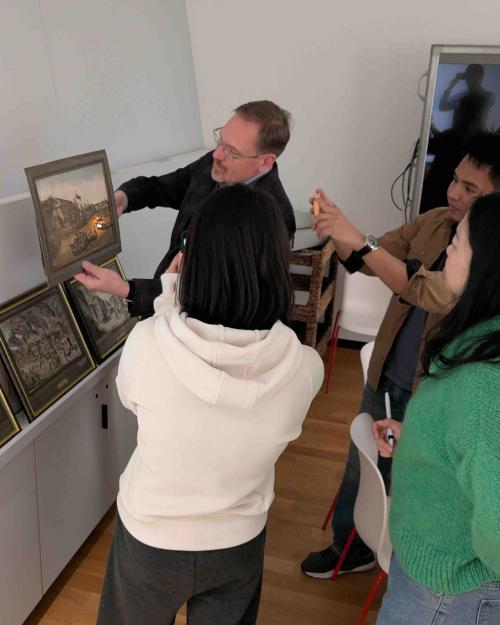During a recent visit to campus, the Pulitzer Prize-winning playwright Paula Vogel shared a story of queer library going. Growing up in the DC area in the 1960s, Paula repeatedly forged her mother’s signature on a series of sick notes so that, every other Friday afternoon, she could skip school—and head to the Library of Congress, where thoughtful staff members set before her books that she would never have otherwise been able to peruse, including most memorably to Paula a wide array of out-of-print lesbian pulp novels from the 1920s.
I have never been as much of a bad girl as Paula, but, like her, I belong to a series of overlapping generations of queer people who would say that we learned how to be queer at the library. Often in the absence of any other identifiable resources—and as we tried to figure out what our largely secret sexuality might mean and how we might begin, furtively, to connect it to the world—we hit the stacks. For in books older and newer, a rich, strange array of worlds was hopefully, which is to say gaily, peopled unlike our oppressive everyday environments. In my case, the way to imagine cultivating a life beyond the stifling norms of the suburban New Jersey of my youth started on a series of dates—with Armistead Maupin’s Tales of the City, a series of novels set in the San Francisco of the 1970s and 80s; with Quentin Crisp’s The Naked Civil Servant, a memoir of surviving homophobic mid-twentieth-century London through the communitarian art of camp; with Oscar Wilde and Jeanette Winterson and Adrienne Rich and many others besides. But among all of these encounters, which felt every bit like crushes and flirtations and one-night-stands and romances, I had the best love affair of all with Virginia Woolf’s Orlando, which taught me not only how to be queer but also, without my knowing it quite at the time, how to be a scholar and teacher.
Subtitled A Biography, Orlando is a novel (and many other strange and wonderful things besides) whose opening pages introduce us to its eponymous protagonist, a brooding teenager who is also a nobleman in the England of Elizabeth I. Orlando never ages past about thirty, but he does live for over three hundred years, during the course of which he wakes up, one glorious morning in the seventeenth century, a woman. Lady Orlando accomplishes a number of feats, including the publication in 1928 of a poem, The Oak Tree, whose composition is begun around 1600, and the loving inhabitation of a successful marriage—one that works precisely because her changeable and complicated husband is just as gender nonconforming as she is.
Like its hero-cum-heroine, Orlando the novel also accomplishes a number of feats. It is a meditation on time and how we may dispose ourselves within time’s curious folds. It is a cheeky tour through British literary history, recast by Woolf in a sly, feminist light. It is a funny but also moving celebration of a singular subjectivity—and a body—that cannot be contained by the normative categories of sex, gender, desire, and pleasure. In short, it is the perfect book for a nerdy queer sixteen-year-old, more or less on the brink of heading off to college, where coming loudly out would coincide with—and, indeed, be shaped by—poring over the poets and novelists with whom Orlando hangs out in Woolf’s pages (guest star: Alexander Pope!) and imbibing the queer theory that Woolf anticipated and influenced.
Yet college was not the only school formation in which reading and loving Orlando bore fruit for me. And becoming the scholars we are is influenced as much by our early teachers as by the books we read. So telling you about Orlando is also a matter of telling you about Skip, the discerning tenth-grade English instructor who could see that I was desperately bored in school and decided to take some unorthodox steps to save me from that boredom. This program included letting me ditch a required paper on Melville. “You pick,” he said of the object for the essay and let me add to his syllabus a book of my choice. And so, unlike Tales of the City and The Naked Civil Servant and all those other, more strictly extracurricular queer dates, Orlando came, in its fashion, out of the closet and into the classroom.
I would be lying if I told you I could remember anything substantial or concrete about that tenth-grade paper. (Which is a big relief.) But I do remember the encouragement with which Skip approved my choice of material, the enthusiasm with which he read Orlando and talked about it with me, the praise with which he greeted the essay I wrote for him—and the happiness and pleasure that this loving guidance enabled me to experience in attempting my literally sophomoric version of literary criticism. I have not ever proceeded to write about Orlando professionally, but because Skip invited me to follow my nose, take a risk, and set pen to paper with an intellectual ambition yoked to a passion for my material, he modeled the kind of space that I continue to try to inhabit, as well as I can, in writing scholarly prose. Skip also modeled how to be a dedicated mentor: investing real time, energy, and attention, identifying need, adapting a plan or course to make for a stronger pedagogical journey, and greeting academic labor with critical generosity.
Another thing I learned from both Skip and Orlando is how to love a stylish sentence—and this novel of Woolf’s is full of some of her best. Consider the following description of England’s Great Frost of 1608, which the royal court chooses to greet with a series of festivities that nonetheless cannot entirely overcome the weather: “Frozen roses fell in showers when the Queen and her ladies walked abroad. Coloured balloons hovered motionless in the air. Here and there burnt vast bonfires of cedar and oak wood, lavishly salted, so that the flames were of green, orange, and purple fire. But however fiercely they burnt, the heat was not enough to melt the ice which, though of singular transparency, was yet of the hardness of steel.” In phrasing whose angles and edges, contours and rhythms, echoes and bursts mime the alternating heaviness, heat, ice, and hardness that they image forth, Woolf writes in a way that I would call delicious for her readers. Conjuring such deliciousness is a gift to whose giving any scholar, writer, and teacher would do well, perpetually, to aspire.




